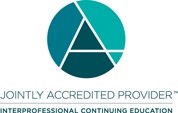"The class was fabulous! I learned so much, thank you.", Tami T.
Description of Program
Oral anticoagulation therapy is associated with an increased risk for adverse drug events leading to emergency department visits and readmission to acute care facilities. Since the 1960s warfarin was utilized to improve patient outcomes. Despite the challenges associated with its use, warfarin remains a foundational drug for patients. Starting in 2010, the direct oral anticoagulants represent other choices for patients. Health care professionals who care for patients requiring these medications must remain knowledgeable on the current guidelines and best practices to improve patient outcomes.
Who should enroll in this program?
This program is designed for English-speaking health professionals (nurses, advanced practice registered nurses, pharmacists, and physicians) involved in the management of patients requiring oral anticoagulation therapy.
Program Content
This program reviews the physiology and pathophysiology of the clotting system, patient conditions associated with oral anticoagulation, the pharmacokinetics of warfarin and DOACs, and evidence-based guidelines. A textbook is not required for this program.
Program Schedule
This independent study program is available on demand. Completion of the program is required within one year of registration.
Learning Outcome
The learning outcome of this program is to enable the learner to distinguish the differences and similarities between the oral anticoagulant drugs and employ the current therapeutic guidelines and best practices in managing anticoagulation therapy through interprofessional collaborative practice.
Program Objectives
At the conclusion of this program, the participant will be able to:
Delivery of the Content
The learner will log into the program via the internet and work independently through the modules. The independent study provides an opportunity to learn while in the comfort of your own home and office. Program staff are available during business hours by phone or email to assist participants with technical issues or concerns. Questions regarding content can be directed to the contributors of the content. After the learner works through the content, she/he will complete the case-based comprehensive exam.
Note: Many businesses, especially government agencies or health institutions, utilize security firewalls. Access to web links within program and communication from the instructor, or other students may be blocked. We recommend not using your work email address for this course.
Contact hours
10 contact hours
The University of Southern Indiana designates this activity for 10 contact hours related to pharmacotherapeutics for nurses. This content meets the pharmacology continuing education requirements for the renewal of the advanced practice registered nurse prescriptive authority license.
The University of Southern Indiana Center for Health Professions Lifelong Learning designates this knowledge based Accreditation Council for Pharmacy Education (ACPE) activity for 10 contact hours for completion of this program. Pharmacists who request to have their contact hours reported to the Certified Pharmacy Education Monitor (CPE) must indicate this request during registration and include the correct NABP e-PID# and Birthdate (mmdd).
The University of Southern Indiana Center for Health Professions Lifelong Learning designates this activity for a maximum of 10.0 AMA PRA Category 1 Credits™. Physicians should claim only the credit commensurate with the extent of their participation in the activity.
Successful completion of this program does not guarantee expertise in the content. Clinical experience and judgment coupled with an understanding of the content are necessary to attain competency. Achieving certification is a means to demonstrate competency.
Criteria for Successful Completion
Faculty Name and Credentials
We strive to provide interprofessional education by utilizing a variety of content experts, instructors, contributors, and reviewers.
Jane Swartz DNP, RN, ACNS-BC
Holly Jahn PharmD, CACP
Conflict of Interest Statement
No individual in a position to control content has any relevant financial relationships.
Expiration date of this content: August 1, 2023.
Accreditation Statements

In support of improving patient care, University of Southern Indiana Center for Health Professions Lifelong Learning is jointly accredited by the Accreditation Council for Continuing Medical Education (ACCME), the Accreditation Council for Pharmacy Education (ACPE), the American Nurses Credentialing Center (ANCC), the American Psychological Association (APA), and the Association of Social Work Boards (ASWB) Approved Continuing Education (ACE) program to provide continuing education for the healthcare team.
State of Indiana
The University of Southern Indiana is an approved provider of continuing education for several professionals licensed in the state of Indiana, including social workers, marriage and family therapists, psychologists, occupational therapists, occupational therapy assistants, and dental professionals.
State of California
The University of Southern Indiana is approved by the California Board of Registered Nursing. Provider #13378.


To Register: Click on the link above. We recommend utilizing Chrome or Firefox with a computer or tablet to register for our programs.
Questions? Call toll-free 1-877-USI-HLTH (874-4584) or 812-461-5217 or email usi1nhpcert@usi.edu
Enrollment Cost
$300
The fee includes access to the program, along with all resources and handouts.
There is a $25.00 fee to invoice.
If you have completed our 40 hour interactive online Anticoagulation Management Certificate Program online you are eligible for a $50 discount. Indicate on your registration form.
Pharmacists who request to have their contact hours reported to the Certified Pharmacy Education Monitor (CPE) must indicate this request during registration and include the correct NABP e-PID# and Birthdate (mmdd). NOTE: Reporting of CEs should be requested during registration. There is an additional $50 charge for reporting.
Physicians who request to have their contact hours reported must indicate this request during registration and include Birthdate (mmdd), licensing ID, and licensing state. NOTE: Reporting of CEs should be requested during registration. There is an additional $50 charge for reporting.
Refund Policy
A $50 administrative fee will be charged prior to accessing the program. No refund will be given after the program has been opened.